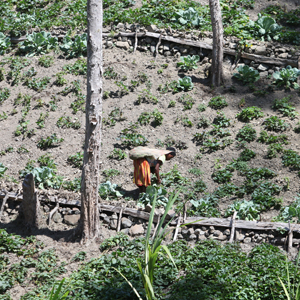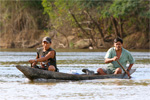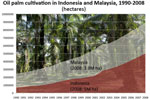Progress over the past 25 years in recognizing indigenous peoples’ rights to land and resources has been interrupted by a worldwide commodity boom, argues a new report published by the Rights and Resources Initiative (RRI).
The report, “Pushback: Local Power, Global Realignment,” says that surging food and energy prices—and associated appreciation of land values—have led some governments to pause on land tenure reform, and in some cases, rollback hard-won rights. The report cites instances in Asia, Africa, and South America where large blocks of land traditionally used by local people have been sold or leased to industrial interests. Local people have seen little in return.
In a conversation with mongabay.com, Andy White, coordinator of RRI, discussed the new report and broader rights issues.
AN INTERVIEW WITH ANDY WHITE
mongabay.com: What is your background and what led you to this line of work?
Andy White: I was raised in far western North Carolina where my father was in the sawmill business and my favorite pastime was running around the woods, camping and backpacking. So I grew up loving both the wind in the trees and the smell of fresh sawdust.
 Andy White. |
My interest in the politics of forests was sparked by a public consultation meeting held in Robbinsville, North Carolina in 1975 when the Bemis Lumber Company was selling its forest land, adjoining the southern edge of the Smoky Mountain National Park. The Sierra Club wanted the government to buy it and extend the park and the local community wanted to keep the logging and jobs going. It was quite a feisty meeting and they all seemed to have reasonable arguments to me. It was a fascinating experience for a young boy and a wonderful introduction to the complicated challenges of figuring out what’s best for society.
I went on to study forestry and political science, then spent 5 years in Haiti learning about development from peasants. After that I went back to graduate school for a Masters in Anthropology studying traditional rural organizations and institutional and technical innovations, and then a PhD in forest economics – studying the conditions for collective action for natural resources management. I then spent 5 years working for the World Bank on rural development and environmental projects in Haiti, the DR and Mexico, and subsequently left the Bank to help start Forest Trends. I left Forest Trends in 2005 with colleagues to start the Rights and Resources Initiative, where I am now.
mongabay.com: You have spoken about a global land grab in the tropics. What is driving this land grab? In what countries is the problem the worst?
Andy White: It’s driven by the increasing scarcity of arable land and the booming demand for all land-based commodities (food, biofuel, wood fiber) plus minerals (the location of which also overlaps with forest areas). It’s hard to say where it’s worst. It depends on your definition of “worst”. It is present in China, where local governments are still often corrupt and local people do not have rights of legal recourse; in India, where the bulk of the “grab” is from domestic, rather than international investors – and there’s little transparency and thus difficulty in tracking; in Latin America – where rights are conferred on paper, but governments often still allocate use to oil, gas, and bioenergy investors; and Africa – where governments still officially claim ownership over the land and seem eager to hand it over to the highest bidder despite the longstanding existence of local people.
mongabay.com: Are there countries that are doing a good job protecting the rights of communities to manage their resources?
Andy White: Certainly. Mexico comes to mind as perhaps the best, and rights are generally stronger, and community organizations are generally stronger in Latin America than in other regions.
mongabay.com: What does a workable REDD-mechanism look like? What are they key safeguards that need to be in place? How can REDD be made more inclusive?
 Dani woman working in a sweet potato field in Papua Province, Indonesia. Photo by Rhett A. Butler. |
Andy White: I don’t know what a workable REDD mechanism looks like. I think it will take different forms in different countries. I don’t expect to see a global market for forest carbon, at least anytime soon. There need to be social and environmental safeguards (the UNFCCC REDD text is pretty good). And because the REDD world has become so fragmented – with the majority of funds now going through bilateral, rather than the multilateral channels, it’s now critical for bilateral parties to adopt safeguards (e.g. the Norwegians, USAID, DFID, etc).
mongabay.com: Industrial interests like to tout their role in poverty alleviation efforts, especially in places like Indonesia. What are your thoughts on these claims?
Andy White: True, clearcutting forests and tending oil-palm plantations creates jobs. But these are “boom-bust” jobs, often given to outsiders, not sustainable, local jobs and not nearly to the scale produced by small-holder forestry or oil-palm and local enterprises. The recent analysis by RRI and colleagues shows that small-holder production and enterprises can on average double the jobs and revenues to conventional industrial enterprises. The conventional business models also abuse the human and civil rights of local people and foster corruption – not exactly what governments and the global community should be promoting.
mongabay.com: Are there any large companies you would cite as leading the way on issues like FPIC and community management of resources?
Andy White: I don’t know of any right now, not in the developing world. Stora Enso (Finnish-Swedish pulp and paper manufacturer) is of course better than most – but we just saw how they willingly screwed up in China – letting their overall ambitions blur their commitments to CSR.
Of course, FPIC and community management of forests is standard practice in the developed world, where rights are recognized and protected by government and legal systems – and large forest companies have developed successful business models around these social and political realities. For example, UPM Kymene and Stora Enso operations in the Finland and Sweden are all based on purchasing wood from small-holders, and they certainly only purchase if the private holder gives them permission. The bulk of the US forest industry now relies on supply from the private, non-industrial forests of the American Southeast. So, large companies and large conservation organizations are not inherently averse to human rights, they just have managed to pursue their interest for decades without having to face them in developing countries. Of course, they will have to adapt as democracy and development emerges in the forest areas of the developing world. We will see who among the companies and the conservation organizations continue to hold out against rights and justice, and who becomes willing allies for democracy and (real) development.
mongabay.com: Taking a step back, are global policy-makers more or less aware of issues like community involvement in management of resources than they were a generation ago? Is progress being made or are we regressing?
Andy White: I think more so, but awareness is not nearly sufficient. The vested interests in the status quo are just as strong, or stronger, and now that forests are worth a lot more there is even more reason for governments to not hand them over. That said, there is progress in some places, just as there is rollback in others.
I wrote the following in reference to the UNFF meeting in NY last week
-
I hope that governments are not coming to New York with plans to celebrate. Rather, this is a moment of government remorse, regret and mea culpas. There has been shockingly little progress since the first global forestry congress dedicated to “people and forests” in Jakarta in 1978. If governments had taken their agreements there seriously, to put people at the center of forestry, then Indonesia would now be the center of global forest conservation, not leading the world in deforestation and carbon emissions; Central Africa would be renowned for its sustainable community forestry, not for it’s illegal logging and corruption, and Peru would be known for the leadership of its Indigenous Peoples in forestry and not for its massacres.
Of course there has been major progress in some countries – Brazil comes to mind, as well as the Philippines, and Mexico. But 32 years after the first global congress on “people and forests”, governments still claim ownership over a majority of the forests across the world despite historic ownership by local peoples, despite clear evidence that Indigenous Peoples and forest communities do a better job at conservation than governments, and despite the fact that government promoted forest industries have led to corruption and continued exclusion of local people, extensive abuses of women and children and entrenched poverty. And, perhaps most interesting to the global community right now, if governments had been serious 32 years ago, deforestation would not be a major cause of climate change, and contributing more carbon emissions than the entire global transport fleet, and northern governments would not be robbing their budgets for promoting health, education and poverty reduction to pay tropical governments and their industries to stop deforestation.
For this UNFF to not be just another government gala, and if the forest sector wants to be taken seriously, this UNFF session needs to take two steps, and then act on them: 1) use the new global attention to forests to take big steps to recognize the land rights of Indigenous Peoples and forest communities – “giving back” the forests to the people – and allowing them to conserve, use and enjoy their forests for themselves and for the betterment of the planet; and 2) change the conventional forest industry and forest protection models that they promote – industrial concessions and public protected areas – recognizing that they are not only anti-local people and human rights, but failing at achieving conservation or development.
These two steps will not only be the right thing to do in terms of promoting human rights and justice, but also be the smartest, most effective measures possible to reduce deforestation and advance social and economic development in forest areas.
 |
Over the last few days, as I’ve had time to think about it more, it’s now finally dawning on me that the central message of “Pushback” is that to achieve conservation at scale, as well as poverty alleviation, food security – development and democracy in the forest areas of the world – we need to look beyond the piecemeal protected areas and REDD projects, and recognize the rights and unleash the entrepreneurial energies of the over 1 billion poor that live in and around forests. This is the real “game-changer” that will save our forests, and enable our forests to help save our planet. Rather than continue to parachute ideas (or money) in from the north, it’s time to recognize that these people are citizens, they are entrepreneurs and they have rights – and they are also far better than their governments in conserving forests!
Related articles
Rising land, food prices cause recognition of indigenous peoples’ rights to stagnate
(02/09/2011) Rising food, energy, and mineral prices, coupled with new interest in forests for their carbon-storing capacity, are driving a global land grab that threatens the rights of hundreds of millions of people living in and around tropical forests, argues a new report published by the Rights and Resources Initiative (RRI).
Report: indigenous people deserve right to refuse big companies
(02/04/2011) As large-scale mining, logging, and plantations threaten indigenous communities worldwide, a new report from the indigenous rights NGO Amazon Watch states that when extractive industries work in indigenous people’s territories, the peoples’ rights must be respected. The report argues that all indigenous groups have the right to ‘free, prior, and informed consent’ of any resource extraction occurring on their lands, and that this international standard should be upheld not only for obvious moral reasons, but for sound business.
‘Land grab’ fears in Africa legitimate

(01/31/2011) A new report by the International Institute for Environment and Development (IIED) has found that recent large-scale land deals in Africa are likely to provide scant benefit to some of the world’s poorest and most famine-prone nations and will probably create new social and environmental problems. Analyzing 12 recent land leasing contracts investigators found a number of concerns, including contracts that are only a few pages long, exclusion of local people, and in one case actually give land away for free. Many of the contracts last for 100 years, threatening to separate local communities from the land they live on. “Most contracts for large-scale land deals in Africa are negotiated in secret,” explains report author Lorenzo Cotula in a press release. “Only rarely do local landholders have a say in those negotiations and few contracts are publicly available after they have been signed.”
United States to back U.N. indigenous rights declaration
(12/23/2010) The United States will endorse the United Nations Declaration on the Rights of Indigenous People (UNDRIP), making it the last industrialized power to support the agreement, which recognizes the rights of indigenous peoples on issues including free prior and informed consent (FPIC), right to sovereignty, territory and respect for traditional knowledge. The move was announced last week by President Barack Obama.
Amazon tribe establishes first indigenous forest carbon fund
(12/04/2010) A half-century ago, Brazil’s Suruí people knew little of the world beyond their cluster of villages – and nothing of the European settlers who dominated their continent. By 2006, that world beyond had engulfed them – a fact their young chief, Almir Narayamoga Suruí, saw all too clearly the first time he logged onto Google Earth.
50 NGOS tell big oil to get out of uncontacted natives’ territory
(11/21/2010) A letter signed by over 50 NGOs is calling on three big oil companies—Perenco, Repsol-YPF, and ConocoPhillips—to withdraw from Peruvian territory inhabited by uncontacted indigenous tribes. The letter states that the oil companies’ presence in the area threatens the uncontacted tribe with diseases, for which they have little immunity, and puts the lives of oil company workers in jeopardy, since past encounters have ended in violence.
Rainforests, wildlife preserved by indigenous spiritual beliefs

(11/15/2010) New research within the native Wapishana and Makushi communities of
Guyana suggests that indigenous cultural beliefs such as shamanism
help preserve tropical forests and wildlife. The analysis, published in the September 2010 Journal of Latin
American Geography, draws from a massive data set that tracks wildlife
populations, hunting kill sites, and spiritually significant features
of the landscape within a 48,000-square-kilometer area in southern
Guyana. The authors recruited the hunters themselves to record much of
the data.
Rapid growth of palm oil industry tramples indigenous peoples’ rights, says report

(08/30/2010) Rapid expansion of oil palm plantations across Southeast Asia have run roughshod over customary tenure systems, resulting in exploitation of local communities, conflict, and outright human rights abuses, reports a new assessment of the palm oil sector by the Forest Peoples Programme (FPP), an international indigenous rights group.
Papua New Guinea strips communal land rights protections, opening door to big business

(06/30/2010) On May 28th the parliament in Papua New Guinea passed a sweeping amendment that protects resource corporations from any litigation related to environmental destruction, labor laws, and landowner abuse. All issues related to the environment would now be decided by the government with no possibility of later lawsuits. Uniquely in the world, over 90 percent of land in Papua New Guinea is owned by clan or communally, not be the government. However this new amendment drastically undercuts Papua New Guinea’s landowners from taking legislative action before or after environmental damage is done. Essentially it places all environmental safeguards with the Environment and Conservation Minister.
Environmentalists and indigenous groups condemn plan for six dams in Peruvian Amazon
(06/21/2010) Environmentalists and indigenous groups have come together to condemn a 15 million US dollar plan for six hydroelectric dams in the Peruvian Amazon, signed last week by Brazilian President Luiz Inácio Lula da Silva and Peruvian President, Alan Garcia. While the six dams would produce over 6,000 megawatts, mostly for Brazil, critics say the dams will flood tens of thousands of hectares of rainforest, devastate the lifestyles of a number of indigenous groups, and only serve big Brazilian corporations.
Taking back the rainforest: Indians in Colombia govern 100,000 square miles of territory

(05/10/2010) Indigenous groups in the Colombian Amazon have long suffered deprivations at the hands of outsiders. First came the diseases brought by the European Conquest, then came abuses under colonial rule. In modern times, some Amazonian communities were virtually enslaved by the debt-bondage system run by rubber traders: Indians could work their entire lives without ever escaping the cycle of debt. Later, periodic invasions by gold miners, oil companies, colonists, and illegal coca-growers took a heavy toll on remaining indigenous populations. Without title to their land, organization, or representation, indigenous Colombians in the Amazon seemed destined to be exploited and abused. But new hope would emerge in the 1980s, thanks partly to the efforts of Martin von Hildebrand, an ethnologist who would help indigenous Colombians eventually win control over 260,000 square kilometers (100,000 square miles) of Amazon rainforest—an area larger than the United Kingdom.